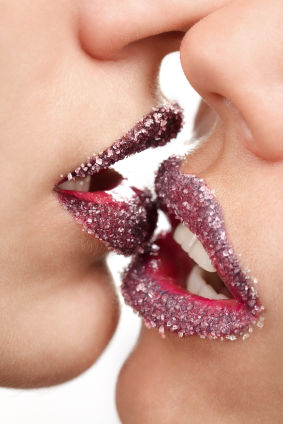Sex
Girls Kissing Girls
Why do straight girls hook up with each other in public?
Posted July 9, 2012 Reviewed by Matt Huston

Have you ever hooked up with a girl at a party? In a recent study, a full one-third of straight college women (that’s right, we’re not focused on straight men or lesbians here) answered “yes” to this question. If your answer is “no,” you might be wondering whether or not you’re missing out.
Using mainstream media as your guide (think Madonna and Britney or Sandra Bullock and Scarlett Johansson at the MTV awards), you might guess that Katy Perry’s lyrics about girls kissing each other (and liking it) represent the norm, rather than the exception. Despite the popularity of the idea that girls are publicly hooking up with each other at parties, at the bar, and, of course, on spring break at rampant rates, there has actually been very little research documenting the frequency, causes, and consequences of this phenomenon.
A new paper published in Psychology of Women Quarterly began to examine these titillating questions. Lead author Megan Yost and her co-author Lauren McCarthy sought to provide the first empirical evidence of the prevalence of and reasons for heterosexual women kissing each other at parties (despite their behavior, no one considers these women lesbians). They found that 69% of college women and men have “been at a party at college and seen 2 girls kissing or making out” and a full 33% of the college women reported that they had “kissed or made out with someone of the same-sex at a college party.” Thus, a majority of college students report seeing this behavior and a significant minority of women report having engaged in this behavior themselves.
Yost and McCarthy also interviewed straight women who reported publicly making out with other women. The key findings include: All of the incidences occurred when the women were drinking alcohol as well as prompted by others (e.g., boyfriends or “dare” games). Yost and McCarthy also described firsthand accounts of women’s motivations for this Girls Gone Wild behavior. At the top of the list, 56% of women reported a desire for male attention, including “turning on” a boyfriend or communicating sexual availability to eligible bachelors. Forty-three percent reported wanting to contribute to a fun party atmosphere, while 42% reported hooking up with another girl because they were drunk. Female bonding (26%), sexual experimentation (23%), shock value (22%), and obtaining resources like money or alcohol (16%) rounded out the list.
This research contributes to a growing area of study in psychology, with investigators examining when and why women engage in a behavior dubbed self-sexualization. Self-sexualization occurs when women actively present themselves in a sexualized manner or as a sex object to others (Allen & Gervais, 2012), including dressing sexy, using catwalks at dance clubs, taking pole-dancing or striptease classes, or kissing other girls (Nowatzki & Morry, 2009).
One of the primary questions in this area of research is whether such self-sexualizing acts are empowering or oppressive. Is this something they want to do or not? The answer to this seductively simple question is, well, complicated. Some women report that they enjoy being sexualized by men (Liss, Erchull, & Ramsey, 2011) and women may feel like they can “fit in” and "stand out" when they self-sexualize (Allen & Gervais, 2012). Yost and McCarthy offer some further insight in this regard, reasoning that hooking up with other girls doesn’t represent true empowerment if it occurs due to pressure from other people. While many women noted that they felt powerful from arousing sexual desire in men and engaging in sexual experimentation, only 16% of the women reported this in the absence of explicit pressure from others. Instead, most women (64%) reported that they felt sexually objectified or degraded during these experiences.
Although this might appear to represent the sexual liberation that women have worked so hard toward, is this the type of gender equality we’re really looking for (after all, when was the last time you saw two straight men locking lips for the enjoyment of women)? Sure, women can now sometimes openly display their sexuality (if they are young, attractive, White, heterosexual), but if it’s still directed toward garnering men’s attention, it sounds a bit more like oppression disguised as empowerment.
So ladies, the next time you’re at a party considering hooking up with your best friend or that hot chick from across the room, think twice about who you’re really doing it for.
Copyright 2012 by Sarah J. Gervais. All rights reserved.


